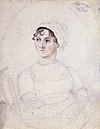Henry Tilney
| Henry Tilney | |
|---|---|
| Jane Austen character | |
| In-universe information | |
| Gender | Male |
| Occupation | Clergyman |
| Family | General Tilney |
| Relatives | Miss Eleanor Tilney; Captain Frederick Tilney |
| Home | Northanger Abbey/Woodston Parsonage |
Henry Tilney is the leading man in Jane Austen's 1817 novel Northanger Abbey. The younger son of a local landowner, Tilney is comfortably placed as a beneficed clergyman on his father's estate.
Character
Tilney, with his teasing yet kind-hearted mentorship of Catherine, has been considered the nicest of Austen's heroes.[1] At the same time, with his knowledge of muslin and of Gothic novels, he is the least masculine of heroes.[2] Overshadowed by his military father and elder brother, he is a strangely passive figure, falling for Catherine only after she falls for him,[3] and with his father as the driving force behind her coming to the Abbey.[4] Nevertheless, he does not lack moral courage, as he shows with his marriage at the book's close.[5]
Origins
Frank Swinnerton considered that, as a teasing mentor, knowledgeable on female matters, Tilney might represent a disguised version of the author herself.[6] Later critics, more cautiously, have seen him as representing in part the author's "voice".[7]
Sydney Smith, who is known to have overlapped with Austen in Bath at the close of the eighteenth century, and whose witty conversation resembles Tilney's, has also been seen as a possible model for the character.[8] So too has Austen's witty brother Henry: “affectionate & kind as well as entertaining....he cannot help being amusing”.[9]
See also
References
- ^ G. B. Stern, Talking of Jane Austen (London 1946) p.73
- ^ Claire Harman, Jane's Fame (Edinburgh 2009) p. 249
- ^ R. Jenkyns, A Fine Brush on Ivory (Oxford 2007) p. 135-6
- ^ E. Copeland, The Cambridge Companion to Jane Austen (Cambridge 1997) p. 38-9
- ^ G. B. Stern, Talking of Jane Austen (London 1946) p.153
- ^ G. B. Stern, Talking of Jane Austen (London 1946) p.74
- ^ B. Hardy, Reading of Jane Austen (2000) p. 166
- ^ B. Benedict ed. Jane Austen: Northanger Abbey (Cambridge 2006) Introduction p. xxv
- ^ Deidre Le Faye ed., Jane Austen's Letters (Oxford 1996) p. 101-2 and Introduction p. x

